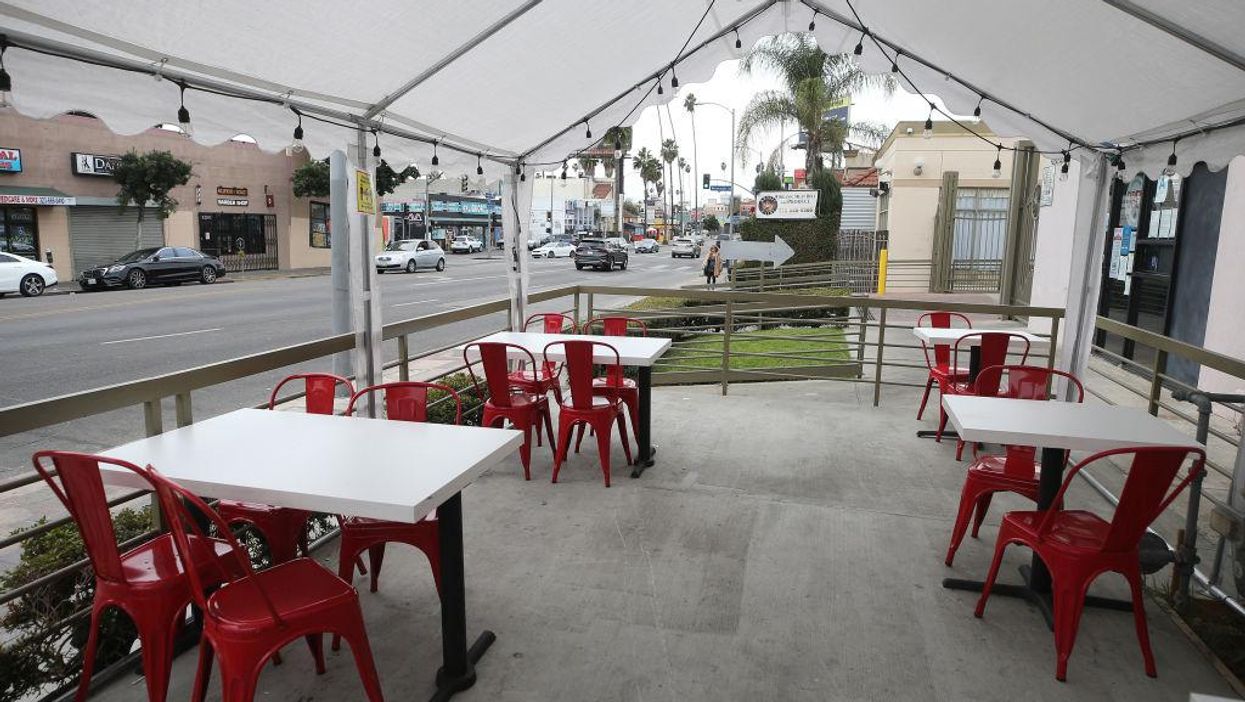
Mario Tama/Getty Images

'The county acted arbitrarily and its decision lacks a rational relationship to a legitimate end'
Los Angeles County acted "arbitrarily" and failed to conduct a proper "risk-benefit" analysis when it ordered restaurants to end all outdoor dining to slow the spread of the coronavirus, a judge ruled Tuesday. However, new state coronavirus restrictions will keep restaurants from serving people in-person for the time being, the Los Angeles Daily News reports.
A regional stay-at-home order imposed by California Gov. Gavin Newsom supersedes the judge's ruling, requiring all restaurants in the area designated as "Southern California" to limit their services to takeout and delivery because remaining ICU capacity in regional hospitals has fallen below 15%.
Despite having consistently some of the strictest lockdown measures in the country since the start of the pandemic, Los Angeles County on Wednesday reported 9,243 new confirmed cases of coronavirus, the second-highest daily total since the pandemic began, according to KTLA-TV. As cases began surging last month, the Los Angeles County Board of Supervisors on Nov. 24 voted to uphold restrictions recommended by the Department of Public Health to temporarily ban in-person restaurant dining outdoors. The restrictions were met with outrage from restaurant owners who, already struggling because of the pandemic, fear that new mandates prohibiting them from conducting business will cost them their livelihoods.
In response, the California Restaurant Association and restaurant owner Mark Geragos each filed lawsuits seeking a court injunction to block the county from enforcing the ban on dining.
Superior Court Judge James Chalfant, in a 53-page opinion, said that "by failing to weigh the benefits of an outdoor dining restriction against its costs, the county acted arbitrarily and its decision lacks a rational relationship to a legitimate end."
"Plainly, the County established that the surge is legitimately concerning, particularly hospitalizations, ICU load, and deaths," Chalfant wrote. "The principal question is: Does the action of closing outdoor restaurants have rational support in furthering the reduction of this risk?"
Defending the ban on outdoor dining, lawyers for the county argued that surging COVID-19 cases and hospitalizations necessitated the measures taken by the health department. They pointed out that the coronavirus spreads when people sit next to each other in close proximity without face coverings, eating and drinking, and projecting their voices toward one another.
Judge Chalfant agreed that the county showed increased COVID-19 cases are "burdening the health care system and action is necessary," but said they only presented "generalized evidence" of an increased risk of transmitting the virus via outdoor dining.
The county's argument "only weakly supports the closure of outdoor restaurant dining, because it ignores the outdoor nature of the activity, which the CDC (U.S. Centers for Disease Control and Prevention) says carries only a moderate risk, and less with mitigations," Chalfant wrote.
"While the County had generalized evidence that outdoor dining necessarily means that diners will not wear masks while eating, and that not wearing masks in proximity to another increases the risk of COVID transmission, Petitioners had specific evidence that outdoor dining does not involve any significant COVID risk."
Additionally, Chalfant noted that, "although not widely publicized, the evidence shows that the pandemic is not so overwhelming that the public should live in fear."
"It is sadly true that large numbers of people have died from COVID: 282,000 in the United States, 19,876 in California, and 7,886 in the County. But the mortality rates have gone down as healthcare professionals have learned to treat the disease and the vulnerable groups are known."
That being said, nothing in the restaurant group's argument "undermines the County's conclusion that the mortality from COVID is serious and that the Department must take action to protect those vulnerable and to avoid long-term effects for those who recover."
But the county did not prove "any link between outdoor dining and COVID transmissions, hospitalizations, or mortality."
The statewide lockdown order will remain in place until Dec. 27 at least. Should the county seek to reimpose its restrictions on outdoor dining, which will expire on Dec. 16, it will first have to conduct "an appropriate risk-benefit analysis."
The judge said that the court cannot determine exactly what an appropriate analysis should include, but suggested that the county consider "the economic cost of closing 30,000 restaurants, the impact to restaurant owners and their employees and the psychological and emotional cost to a public tired of the pandemic and seeking some form of enjoyment in their lives."
"The court cannot adequately balance the harms without the County's performance of a risk-benefit analysis," Chalfant wrote. "While the County clearly may take action to reduce COVID's impact on hospital bed space and ICUs, it is not clear that the closure of restaurants may aid in reducing that stress to the system or that the benefits of doing so outweigh the costs."
"The Court today followed the rule of law, and confirmed that the decision process of County Public Health Departments is not free from judicial scrutiny. While their decisions are entitled to great deference, their ability to act is not unbridled. Their decisions must be supported by evidence and rationally related to the interest they seek to protect – public health. Here, there is no evidence supporting an increased risk of COVID transmission through outdoor dining at restaurants, and thus the Court rightfully issued an order prohibiting the Los Angeles County Restaurant Closure Order." said Dennis S. Ellis, an attorney for the plaintiffs.
Editor's Note: This story was updated with a comment from Dennis S. Ellis, of Browne George Ross O'Brien Annaguey & Ellis LLP.